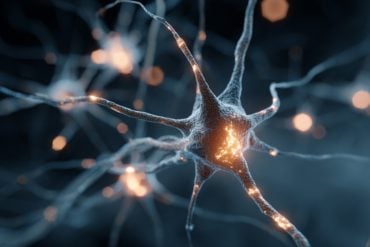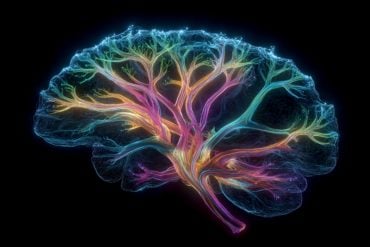Summary: Combining artificial intelligence technology with data sets related to both Alzheimer’s and COVID-19, researchers were able to identify a mechanism by which coronavirus can lead to Alzheimer’s-like symptoms. The findings add to the growing body of evidence that COVID-19 infection can have lasting effects on brain function.
Source: Cleveland Clinic
A new Cleveland Clinic-led study has identified mechanisms by which COVID-19 can lead to Alzheimer’s disease-like dementia.
The findings, published in Alzheimer’s Research & Therapy, indicate an overlap between COVID-19 and brain changes common in Alzheimer’s, and may help inform risk management and therapeutic strategies for COVID-19-associated cognitive impairment.
Reports of neurological complications in COVID-19 patients and “long-hauler” patients whose symptoms persist after the infection clears are becoming more common, suggesting that SARS-CoV-2 (the virus that causes COVID-19) may have lasting effects on brain function. However, it is not yet well understood how the virus leads to neurological issues.
“While some studies suggest that SARS-CoV-2 infects brain cells directly, others found no evidence of the virus in the brain,” says Feixiong Cheng, Ph.D., assistant staff in Cleveland Clinic’s Genomic Medicine Institute and lead author on the study.
“Identifying how COVID-19 and neurological problems are linked will be critical for developing effective preventive and therapeutic strategies to address the surge in neurocognitive impairments that we expect to see in the near future.”
In the study, the researchers harnessed artificial intelligence using existing datasets of patients with Alzheimer’s and COVID-19. They measured the proximity between SARS-CoV-2 host genes/proteins and those associated with several neurological diseases where closer proximity suggests related or shared disease pathways. The researchers also analyzed the genetic factors that enabled SARS-COV-2 to infect brain tissues and cells.
While researchers found little evidence that the virus targets the brain directly, they discovered close network relationships between the virus and genes/proteins associated with several neurological diseases, most notably Alzheimer’s, pointing to pathways by which COVID-19 could lead to Alzheimer’s disease-like dementia.
To explore this further, they investigated potential associations between COVID-19 and neuroinflammation and brain microvascular injury, which are both hallmarks of Alzheimer’s.
“We discovered that SARS-CoV-2 infection significantly altered Alzheimer’s markers implicated in brain inflammation and that certain viral entry factors are highly expressed in cells in the blood-brain barrier,” explained Dr. Cheng. “These findings indicate that the virus may impact several genes or pathways involved in neuroinflammation and brain microvascular injury, which could lead to Alzheimer’s disease-like cognitive impairment.”

The researchers also found that individuals with the allele APOE E4/E4, the greatest genetic risk factor for Alzheimer’s, had decreased expression of antiviral defense genes, which could make these patients more susceptible to COVID-19.
“Ultimately, we hope to have paved the way for research that leads to testable and measurable biomarkers that can identify patients at the highest risk for neurological complications with COVID-19,” said Dr. Cheng.
Dr. Cheng and his team are now working to identify actionable biomarkers and new therapeutic targets for COVID-19-associated neurological issues in COVID long-haulers using cutting-edge network medicine and artificial intelligence technologies.
Yadi Zhou, Ph.D.; Jielin Xu, Ph.D., and Yuan Hou, Ph.D., are co-first authors on the study.
Funding: The study was supported by the National Institute on Aging, the National Heart, Lung, and Blood Institute; the National Institute of Neurological Disorders and Stroke, and Cleveland Clinic’s VeloSano Pilot Program.
About this neurology and COVID-19 research news
Source: Cleveland Clinic
Contact: Alicia Reale – Cleveland Clinic
Image: The image is in the public domain
Original Research: Open access.
“Network medicine links SARS-CoV-2/COVID-19 infection to brain microvascular injury and neuroinflammation in dementia-like cognitive impairment” by Feixiong Cheng et al. Alzheimer’s Research and Therapy
Abstract
Network medicine links SARS-CoV-2/COVID-19 infection to brain microvascular injury and neuroinflammation in dementia-like cognitive impairment
Background
Dementia-like cognitive impairment is an increasingly reported complication of SARS-CoV-2 infection. However, the underlying mechanisms responsible for this complication remain unclear. A better understanding of causative processes by which COVID-19 may lead to cognitive impairment is essential for developing preventive and therapeutic interventions.
Methods
In this study, we conducted a network-based, multimodal omics comparison of COVID-19 and neurologic complications. We constructed the SARS-CoV-2 virus-host interactome from protein-protein interaction assay and CRISPR-Cas9-based genetic assay results and compared network-based relationships therein with those of known neurological manifestations using network proximity measures. We also investigated the transcriptomic profiles (including single-cell/nuclei RNA-sequencing) of Alzheimer’s disease (AD) marker genes from patients infected with COVID-19, as well as the prevalence of SARS-CoV-2 entry factors in the brains of AD patients not infected with SARS-CoV-2.
Results
We found significant network-based relationships between COVID-19 and neuroinflammation and brain microvascular injury pathways and processes which are implicated in AD. We also detected aberrant expression of AD biomarkers in the cerebrospinal fluid and blood of patients with COVID-19. While transcriptomic analyses showed relatively low expression of SARS-CoV-2 entry factors in human brain, neuroinflammatory changes were pronounced.
In addition, single-nucleus transcriptomic analyses showed that expression of SARS-CoV-2 host factors (BSG and FURIN) and antiviral defense genes (LY6E, IFITM2, IFITM3, and IFNAR1) was elevated in brain endothelial cells of AD patients and healthy controls relative to neurons and other cell types, suggesting a possible role for brain microvascular injury in COVID-19-mediated cognitive impairment. Overall, individuals with the AD risk allele APOE E4/E4 displayed reduced expression of antiviral defense genes compared to APOE E3/E3 individuals.
Conclusion
Our results suggest significant mechanistic overlap between AD and COVID-19, centered on neuroinflammation and microvascular injury. These results help improve our understanding of COVID-19-associated neurological manifestations and provide guidance for future development of preventive or treatment interventions, although causal relationship and mechanistic pathways between COVID-19 and AD need future investigations.






